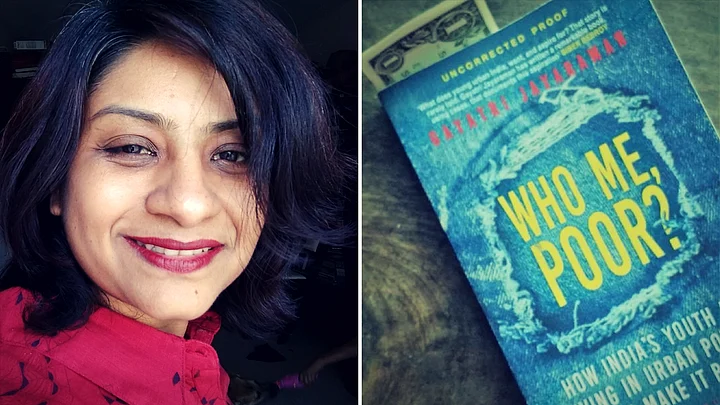A couple of days ago, a friend of mine suggested that we go out for lunch to Barbeque Nation (not the first time she’d asked me that) – and once again, my answer was the same it’s been for the past four years: NO.
Being a full-time novelist and one who has yet to experience breakout success, I’ve thus far been able to wiggle myself out of anything that requires spending a lot of money (shopping at glitzy malls, eating at top end restaurants, catching Olas and Ubers for meetings are a strict no-no for me). “There’ll be a time for that,” I often remind myself. Many of us, however, are not that lucky – not even that savvy, I guess.
Meet the urban poor.
…relative to a vast majority of Indians, they aren’t ‘poor’ at all. But they’re certainly hungry and broke a lot. These are the metro-dwelling twenty-somethings who’ve internalised the pressures surrounding them, and spend a majority of their salaries on keeping up the lifestyles and appearances that they believe are essential to earning those salaries.Gayatri Jayaraman, ‘The Urban Poor You Haven’t Noticed: Millennials Who’re Broke, Hungry, But On Trend’
What are Our Indicators of Wealth?
The Buzzfeed article which went viral last year was snapped up by Bloomsbury after her literary agent, Kanishka Gupta, got in touch with them. Out in stores now, Jayaraman’s first non-fiction book, Who Me, Poor?, takes a closer look at “urban poverty”, asks some really tough questions, makes insightful observations, and reminds us of one of the most hard-hitting debates of our times:
Can you be poor if you own a smartphone?
The answer to that is an unequivocal YES, even though society may not think so.
A primary reason for this is that while our indicators of poverty have not changed since poverty was first defined, our indicators of wealth have. So we tick off the TV, the laptop, the two wheeler or car, as signs that the person in possession of them is doing well enough…(However), a man with those wealth indicators may still struggle to make his ends meet, irrespective of class and income.Gayatri Jayaraman, Who Me, Poor?
True that! – and we need just look around us to see how a lot of people who are otherwise so capable of putting up pretences on their social media accounts, may actually be struggling to pay their bills on time.
The book is replete with personal stories of millennials, many of whom have had a rude awakening to a new idea of success – one that has nothing to do with their educational degrees or the sort of work they do in those swanky offices.
“The idea of success in our heads – what it ought to look like and its signifiers – are largely peer-ordained,” Jayaraman observes in the book and corroborating her claim are models, techies, BPO employees, marketing executives, fashion assistants, entrepreneurs, financial consultants, even Bollywood stars, for that matter.
Excerpts:
If you don’t socialise, you’re the small town girl from Assam.Soma Bhattacharjee, Associate Creative Director, start-up advertising agency in Bengaluru
I traded sex till I bought my iPhone.Shruti Sharma of Mumbai
We lived on glucose biscuits for a few months.Aakarsh Prasad, a graduate of BITS Pilani
We are all leading a certain lifestyle so we fit in.Lisa D’Souza, a PR professional from Kochi and Ahmedabad
You realise that no matter how hard you work, you will never fit in.Neeti Sharma, who is from Lucknow and works at a tech start-up in Mumbai
For one who has had a close brush with “urban poverty” and has seen far too many young, suave-looking professionals struggle with massive amounts of debt, Jayaraman’s book is a biting commentary on this particular brand of poverty, the reasons for which are not hard to find.
She tells me in an email:
There are several systemic pressures outlined in the book, from modes of migration, lack of urban planning, affordability of housing, public transportation, basic infrastructure and facilities, employer work ethic and reward systems that need to change. (And), I do blame these for the pressures laid on young people.
Is financial literacy an answer to this problem, I wonder? She agrees in part,
I think financial literacy is only a part of it. (We need to) fix the system, force it to have vision and inclusion, and then what’s left can be fixed by financial literacy. Else, it’s like filling a bucket with a hole in it.
In as much as the book shows a mirror to the policymakers, it exhorts its readers to identify what success means for them. “It sounds clichéd,” she says in the book, “but being yourself is seriously the best thing you can do for your personality projection and your bank balance” – and we cannot not agree with that.
(Vani has worked as a business journalist and is the author of ‘The Recession Groom’. She can be reached @Vani_Author)
(At The Quint, we question everything. Play an active role in shaping our journalism by becoming a member today.)
